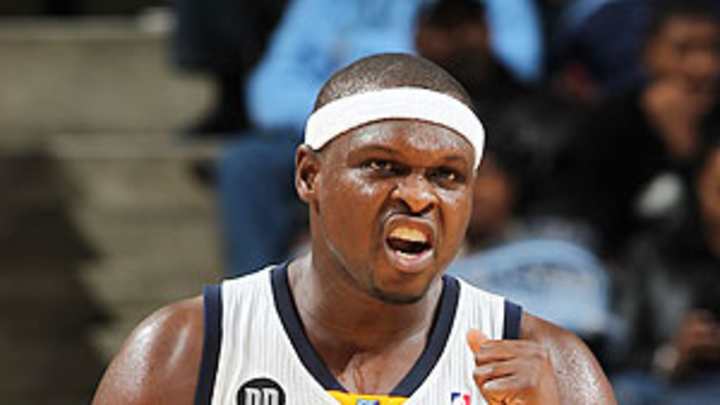Court Vision: The real Randolph

Zach Randolph has had a trying career, but found stability -- and a home -- in Memphis. (Joe Murphy/NBAE via Getty Images)
By Rob Mahoney
• In his latest must-read feature, Grantland's Jonathan Abrams dives into the life and times of Zach Randolph. Z-Bo's story is fascinating for both the details we know and those we never will, but the purpose in telling his story is absolutely vital as well. Some of Randolph's reputation is born of his naiveté, some of it a result of being in the wrong place at the wrong time and some of it is simply due to getting swept up in a scene he should have stayed far away from. He may be characterized by his rap sheet and perceived misconduct, but Randolph is fully three-dimensional and educated through experience:
So when the
Grizzlies
became a contender the following year -- a contract year for Randolph -- Wallace wasn't totally surprised that Randolph had matured into a franchise player. But doing it without
Rudy Gay
, who missed the second half of the season? That was surprising. Randolph meshed wonderfully with
Marc Gasol
to create a suddenly fearsome low-post tandem, averaging 22.2 points and 10.8 rebounds in the 2011 playoffs, besting
Tim Duncan
in the opening round and nearly beating Oklahoma City in a thrilling seven-game series. The Grizzlies awarded Randolph a four-year, $71 million contract extension that summer. Like Memphis, he's sometimes overlooked. He has some history behind him. But he's a little more fun than anyone wants to admit.
"This town has a relationship with me," Randolph explained. "It's not the white side, the black side, it's the whole town. They understand the grind. They've been through it. It's a blue-collar town. People work hard. When you talk about Memphis, it's usually
First 48
or something bad. But there's good people everywhere. And you don't look bad on nobody because somebody went to the penitentiary or somebody did this. You treat everybody the same because everybody's got skeletons. Some people just hide them more. Some don't get brought to the light, but ain't nobody perfect. Nobody."
• Paul Flannery of SB Nation takes us through every crumble of the Thanksgiving week schedule.
• Don't miss Danny Chau's wonderful exploration of Andrei Kirilenko and Alexey Shved, two Russian imports who have become NBA essentials.
• Seth Rosenthal in his power-ranked assessment of Phoenix's play: "The Suns' starters have made a habit of digging the team into a big ol' deficit, shrugging, and hoping the second unit has a ladder."
• Much of Shane Battier's responsibilities on defense have changed with his move to defending opposing bigs, but his meticulous attention to detail and general statistical bent have not. Yet what's arguably most impressive about Battier is his commitment to a macro-level basketball process that goes well beyond single-game shooting stats or the win-loss column -- a more general philosophy of pursuing action independent of result. Matt Moore of CBS Sports spoke on that subject (and many more) with Battier:
But beyond that, Battier's discussion of his process centers more on a basic thing to basketball, and even just to life. It's all about decisions. The data is a tool to determine what the most likely outcome is based on the decision he makes. If he forces a guy left, how well does he score that way? If he hedges on the screen, what's the most likely reaction from the point guard?
The problem, of course, is outliers. Data can tell you one thing, and the results will simply not mirror that suggestion, as was the case on Wednesday night when Battier surrendered the mid-range jumper to
Blake Griffin
, and the All-Star forward hit 4-of-6 from mid-range.
"I played Blake Griffin last night. The numbers say I'd much rather have him shooting a 20-foot jumper than him going to the hole. And he puts up 4-6 numbers on me last night and everyone's going crazy. But you play the process and you have to stay true to the belief in the gameplan."
• A good visualization of how the Bucks compare to the rest of the league by way of the Four Factors.
• It is impossible to play better defense than this against Kyrie Irving.
• Jim Cavan takes a pass at the Nuggets' struggles for The New York Times' Off the Dribble blog:
What remains is delicate scoring balance that resulted in seven
Nuggets
scoring more than 10 points per game a season ago; six players are currently averaging in double figures (Lawson leads the team with a pedestrian 14.2), while
Andre Miller
(9.6) stands close behind. If anything, Denver’s reined-in pace -- though partly a product of having played squads (San Antonio and Miami) adept at dictating tempo -- indicates a team overthinking its own identity.
In a league in which defensive rotations and close-outs are becoming quicker and more refined, the Nuggets need to remind themselves that making the most of the good looks -- quickly, crisply and efficiently -- is what helped them move from lovable underdogs to possible conference contenders in the first place.
• Might semi-retired NBAer Juan Dixon find his way to the D-League?

Rob Mahoney is an NBA writer dedicated to the minutiae of the game of basketball, its overarching themes and everything in between. He joined the Sports Illustrated staff in 2012.